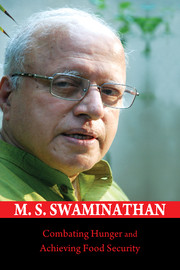Book contents
- Frontmatter
- Contents
- Foreword
- Preface
- Acknowledgements
- Abbreviations
- 1 Genesis and Growth of the Yield Revolution in Wheat
- 2 Our Agricultural Heritage
- 3 Shaping Our Agricultural Destiny
- 4 Thrust on Farm Revival
- 5 Nutri-farm Movement
- 6 Nutrition-sensitive Agriculture
- 7 Food Losses and Food Waste
- 8 Rice in Zero Hunger Challenge
- 9 Monsoon Management
- 10 Importance of Ecological Conservation
- 11 Caring for Ecology and Heritage
- 12 Conserving Biodiversity
- 13 Overcoming Hidden Hunger through Aquaculture
- 14 Biofuels – The Way to Go
- 15 Food Security
- 16 Vigilance for Sustainable Food Security
- 17 Food Security and Social Protection
- 18 Food Security and its Role
- 19 Sustaining the Livestock Revolution
- 20 Challenges in the Year of Science
- 21 Agriculture and Humanism
- 22 Fostering the Science of Science Communication
- 23 Olympic Move for Saving Children
- 24 Youth: The Agents of Change
- 25 Role of Women in Agricultural Production
- 26 Know-how to Do-how
- 27 From Bengal Famine to Right to Food
- 28 Financial Institutions and Fighting Food Inflation
- 29 Public Good Research in Agriculture
- 30 The Future of Indian Agriculture
- Bibliography
21 - Agriculture and Humanism
Published online by Cambridge University Press: 18 December 2015
- Frontmatter
- Contents
- Foreword
- Preface
- Acknowledgements
- Abbreviations
- 1 Genesis and Growth of the Yield Revolution in Wheat
- 2 Our Agricultural Heritage
- 3 Shaping Our Agricultural Destiny
- 4 Thrust on Farm Revival
- 5 Nutri-farm Movement
- 6 Nutrition-sensitive Agriculture
- 7 Food Losses and Food Waste
- 8 Rice in Zero Hunger Challenge
- 9 Monsoon Management
- 10 Importance of Ecological Conservation
- 11 Caring for Ecology and Heritage
- 12 Conserving Biodiversity
- 13 Overcoming Hidden Hunger through Aquaculture
- 14 Biofuels – The Way to Go
- 15 Food Security
- 16 Vigilance for Sustainable Food Security
- 17 Food Security and Social Protection
- 18 Food Security and its Role
- 19 Sustaining the Livestock Revolution
- 20 Challenges in the Year of Science
- 21 Agriculture and Humanism
- 22 Fostering the Science of Science Communication
- 23 Olympic Move for Saving Children
- 24 Youth: The Agents of Change
- 25 Role of Women in Agricultural Production
- 26 Know-how to Do-how
- 27 From Bengal Famine to Right to Food
- 28 Financial Institutions and Fighting Food Inflation
- 29 Public Good Research in Agriculture
- 30 The Future of Indian Agriculture
- Bibliography
Summary
The Union Budget for 2013–14 presented by P. Chidambaram was remarkable in placing faces before figures in preparation of budget proposals. Chidambaram's speech, throughout, emphasized the need to care for women and children, the youth and the poor. Thus, his budget will be remembered not only for its strategies to stimulate economic growth and control fiscal deficit, but also for the importance given to the needs of the economically and socially underprivileged sections of society. The approach to the poor was not one of charity and patronage, but one of skill and knowledge empowerment and asset building.
In the field of agriculture, Chidambaram adopted a three-pronged strategy. First, for defending the gains already made in the original Green Revolution areas like Punjab and Haryana, he proposed crop diversification in a manner that both farm ecology and farm economics could be safeguarded. It is well- known that in this region, which is the heartland of the Green Revolution, the water table is going down and the soil is getting salinized. The Budget provided 500 crore to start the programme of crop diversification. I hope this will be used by the state governments concerned to introduce ecologically desirable rotations, like cereal-legume rotation.
Second, extending the gains to new areas, Chidambaram provided 1,000 crore for expanding the yield revolution to eastern India, particularly in states like Assam, Bihar, Chhattisgarh and West Bengal, where already the schemes introduced by his predecessor Pranab Mukherjee are making their impact felt.
Third, in order to make new gains, Chidambaram provided 200 crore to start on a pilot scale, a major initiative for marrying nutrition and agriculture by establishing nutri-farms. Nearly 60 per cent of consumers are also farmers. The widespread malnutrition prevailing in India can be overcome only if farm families are enabled to have a balanced diet. Organizing nutri-farms will involve introducing in the cropping system bio-fortified crops which are rich in iron, zinc, vitamin A, vitamin B12 and other micronutrients as well as those which are rich in protein like quality protein maize. The programme will be taken up in the districts that are suffering from a high burden of hidden hunger caused by micro-nutrient deficiencies.
In the area of technology development, funds were provided for a National Institute of Biotic Stress Management at Raipur, Chhattisgarh, and for a Centre of Excellence in Agricultural Biotechnology at Ranchi, Jharkhand.
- Type
- Chapter
- Information
- Combating Hunger and Achieving Food Security , pp. 111 - 114Publisher: Cambridge University PressPrint publication year: 2016



